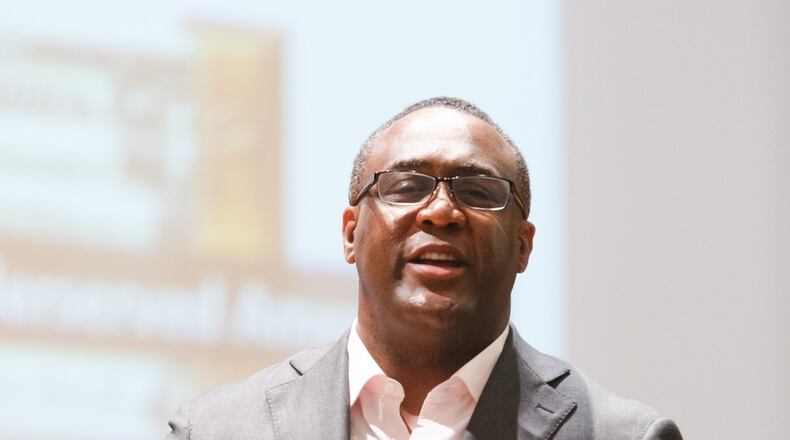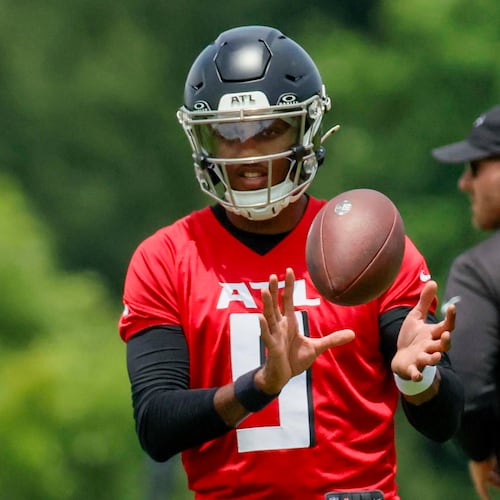NFL players spend most of their careers competing on the field, but when it’s time for them to compete at the highest levels of society, too many struggle.
Former NFL player Johnathan M. Holifield, author of the pioneering book, “The Future Economy and Inclusive Competitiveness: How Demographic Trends and Innovation Can Create Economic Prosperity for All Americans,” believes the same traits that make players successful on the field can be used in society to boost the U.S. economy.
Some players, with Clinton Portis being the latest to publicly acknowledge that he’s lost millions of dollars, could retain their money and build wealth in their respective communities by being as competitive off the field as they were on it.
“The thing that separates professional athletes from the next guy is a spirit of competitiveness, a will to show up and compete at the highest level of your ability,” said Holifield, once a 12th-round pick of the Cincinnati Bengals. “I think competitiveness is a valuable form of intelligence. Some people call it ‘heart,’ others call it ‘intestinal fortitude,’ or, even, ‘guts.’ By whatever name, competitiveness is the great and, perhaps, immeasurable, equalizer on the field, in the classroom and throughout society.
“Many athletes make sense of American society through competition. This includes the ability to constantly recognize evolving conditions and assess the facts, combined with the will to achieve because of (or despite) those facts. The capacity to get knocked down, get back up with a focus on making the play … to do all of that, I think requires a level of intelligence that is supported by the courage to compete. Where many athletes come up short, especially black athletes, is that we often leave on the field, after our careers are over, the very thing that separated us from the rest of the guys — our competitiveness.”
Portis recently told Sports Illustrated that he wanted to kill his financial advisors. He made $43.1 million over his career, but lost it through frivolous spending, shady deals and bad investments.
Holifield, 52, who’s a speaker and consultant at ScaleUp Partners, an economic inclusion and competitiveness consultancy firm, offers a better solution.
“America needs more economic athletes: those who demonstrate the skills mastery, agility, grit, and stamina to achieve sustained economic mobility, security, and prosperity, as well as life satisfaction,” said Holifield, who was on the Bengals 1988 AFC championship team and later earned his master’s degree in education and a law degree from the University of Cincinnati. “We nurture the competitive spirit in athletics, but not throughout society. If we treated competitiveness as a form of intelligence, we’d invest more in its cultivation, especially in education and economic life.”
A number of professional athletes have put into practice an ability to compete in the economic arena, such as Falcons defensive tackle Dontari Poe and former NFL player Dhani Jones. Poe invests in tech start-ups in Silicon Valley and has conducted “Shark Tank”-like competitions for underserved youths to compete and innovate.
Jones has started The Hillman Accelerator, which aims to get more women and minorities into the tech sector in Cincinnati. Interestingly, one of Hillman’s investors is the venture development organization, CincyTech, of which Holifield was founding executive director.
“My interest in this whole area of economic competitiveness really was piqued by the term, ‘competitiveness,’” Holifield said. “When I began to peel it back, I discovered that certain areas of our national economy drive our prosperity. Those sectors are resilient, they overcome hiccups in the global marketplace and they continue to create jobs and wealth. Economic players, like the Atlanta Regional Commission, develop their own economic competitiveness strategies and execute them over five-year periods. To play and compete in the economic game, we must know the strategies and plans to gain a better understanding of where the proverbial puck is headed.”
In his book, Holifield, a former chief executive officer of the Cleveland Urban League, describes economic competitiveness as the ability of firms to succeed in the marketplace, while raising the living standards of the average American. Broadly-defined, innovation is driving U.S. competitiveness in the world economy. However, as Holifield argues, to sustain national success on a global scale, the United States must include and cultivate all of its diverse talent.
“When we talk about the economic inclusion of blacks, women, Latinos, rural populations, generally, we relegate their development to the traditional lifestyle business and community development space,” Holifield said. “We seldom connect their potential contributions to the best opportunities that our regions and the nation have to offer. Many of those opportunities are found in local and regional innovation ecosystems that adopt regional competitiveness strategies. That’s why I’ve evolved customary notions of economic inclusion to inclusive competitiveness.”
New community systems, supported by efforts such as what Poe is doing in Memphis, Tenn., and in his former NFL city of Kansas City, are at the root of these concepts.
“These new systems must persist over decades to produce better education outcomes and create new kinds of businesses that create jobs and wealth,” Holifield said.
There is also sage advice for players so that they don’t end up in Portis’ situation.
“Hold your money and learn how to play the game,” Holifield said. “Don’t just go out and start investing. Hold your money and learn how to be a risk-astute investor. Find a solid mentor who can help you understand how the game is played before you race out onto the field. This is a different game than the one we’ve historically played. However, it’s one you can and should learn. Until then, hold your money. Engage and grow.”
About the Author
Keep Reading
The Latest
Featured



